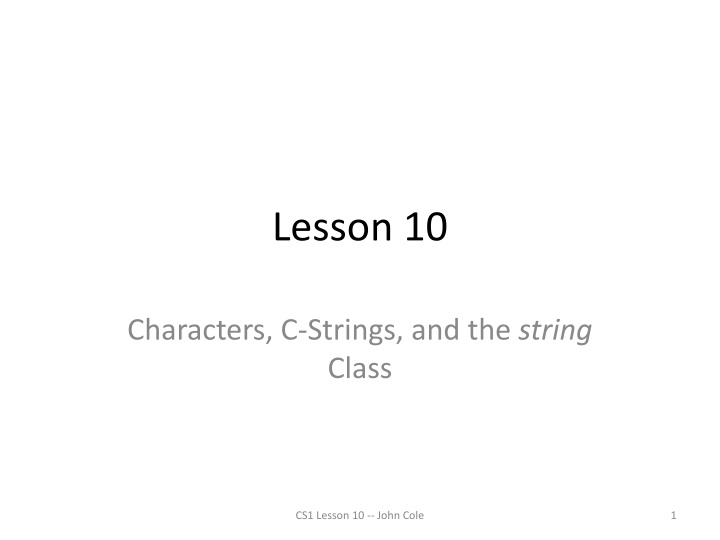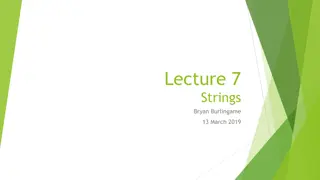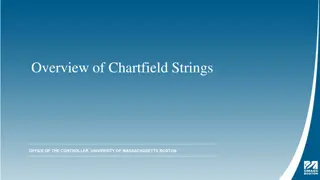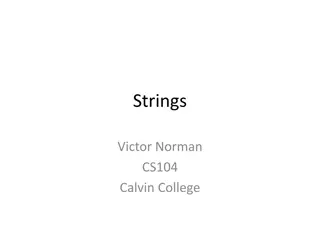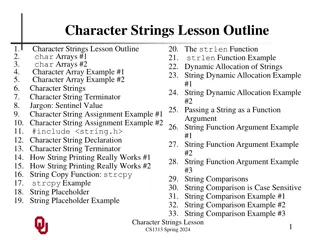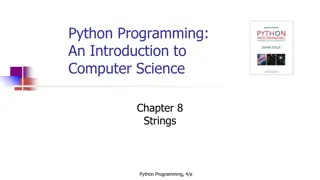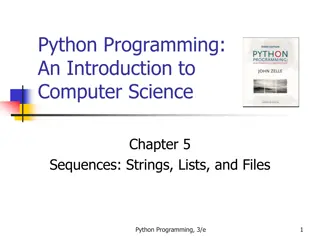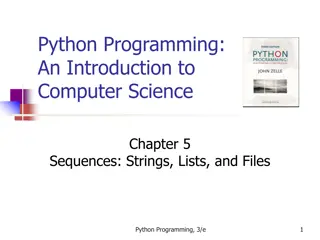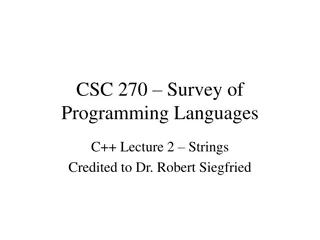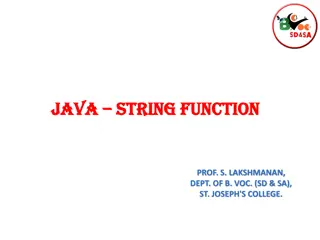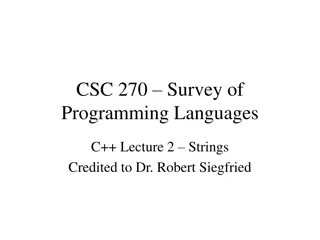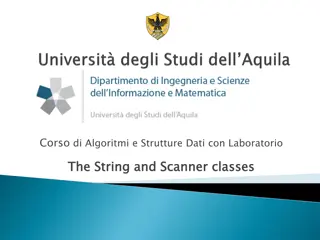Character Functions and C-Strings Basics
This lesson delves into character functions, including case conversion functions like toupper and tolower, as well as the fundamentals of C-Strings in C++ programming. Understanding how characters are manipulated and stored in memory is essential for efficient programming with strings and text data. Explore examples, practical applications, and insights on working with C-Strings in your programming projects.
Uploaded on Feb 16, 2025 | 2 Views
Download Presentation

Please find below an Image/Link to download the presentation.
The content on the website is provided AS IS for your information and personal use only. It may not be sold, licensed, or shared on other websites without obtaining consent from the author.If you encounter any issues during the download, it is possible that the publisher has removed the file from their server.
You are allowed to download the files provided on this website for personal or commercial use, subject to the condition that they are used lawfully. All files are the property of their respective owners.
The content on the website is provided AS IS for your information and personal use only. It may not be sold, licensed, or shared on other websites without obtaining consent from the author.
E N D
Presentation Transcript
Lesson 10 Characters, C-Strings, and the string Class CS1 Lesson 10 -- John Cole 1
Character Testing require cctype header file CS1 Lesson 10 -- John Cole 2
Character Case Conversion Functions: toupper: if char argument is lowercase letter, return uppercase equivalent; otherwise, return input unchanged char ch1 = 'H'; char ch2 = 'e'; char ch3 = '!'; cout << toupper(ch1); // displays 'H' cout << toupper(ch2); // displays 'E' cout << toupper(ch3); // displays '!' CS1 Lesson 10 -- John Cole 3
Character Case Conversion Functions: tolower: if char argument is uppercase letter, return lowercase equivalent; otherwise, return input unchanged char ch1 = 'H'; char ch2 = 'e'; char ch3 = '!'; cout << tolower(ch1); // displays 'h' cout << tolower(ch2); // displays 'e' cout << tolower(ch3); // displays '!' CS1 Lesson 10 -- John Cole 4
C-Strings C-string: sequence of characters stored in adjacent memory locations and terminated by NULL character String literal (string constant): sequence of characters enclosed in double quotes " " : "Hi there!" H i r e ! t h e \0 CS1 Lesson 10 -- John Cole 5
C-Strings Array of chars can be used to define storage for string: const int SIZE = 20; char city[SIZE]; Leave room for NULL at end Can enter a value using cin or >> Input is whitespace-terminated No check to see if enough space For input containing whitespace, and to control amount of input, use cin.getline() CS1 Lesson 10 -- John Cole 6
C-String Library Functions Require the cstring header file Functions take one or more C-strings as arguments. Can use: C-string name pointer to C-string literal string CS1 Lesson 10 -- John Cole 7
C-String Library Functions Functions: strlen(str): returns length of C-string str char city[SIZE] = "Missoula"; cout << strlen(city); // prints 8 strcat(str1, str2): appends str2 to the end of str1 char location[SIZE] = "Missoula, "; char state[3] = "MT"; strcat(location, state); // location now has "Missoula, MT" CS1 Lesson 10 -- John Cole 8
C-String Library Functions Functions: strcpy(str1, str2): copies str2 to str1 const int SIZE = 20; char fname[SIZE] = "Maureen", name[SIZE]; strcpy(name, fname); Note: strcat and strcpy perform no bounds checking to determine if there is enough space in receiving character array to hold the string it is being assigned. You ll get compiler warnings in Visual Studio. CS1 Lesson 10 -- John Cole 9
Search Within a C-String Function: strstr(str1, str2): finds the first occurrence of str2 in str1. Returns a pointer to match, or NULL if no match. char river[] = "Wabash"; char word[] = "aba"; cout << strstr(river, word); // displays "abash" Why does it display abash ? CS1 Lesson 10 -- John Cole 10
String/Numeric Conversion require cstdlib header file CS1 Lesson 10 -- John Cole 11
String/Numeric Conversion int iNum; long lNum; double dNum; char intChar[10]; iNum = atoi("1234"); // puts 1234 in iNum lNum = atol("5678"); // puts 5678 in lNum dNum = atof("35.7"); // puts 35.7 in dNum itoa(iNum, intChar, 8); // puts the string // "2322" (base 8 for 123410) in intChar CS1 Lesson 10 -- John Cole 12
String/Numeric Conversion if C-string contains non-digits, results are undefined function may return result up to non-digit function may return 0 itoa does no bounds checking make sure there is enough space to store the result. In Visual Studio you ll get warnings. CS1 Lesson 10 -- John Cole 13
Writing C-String Functions Designing C-String Handling Functions can pass arrays or pointers to char arrays Can perform bounds checking to ensure enough space for results Can anticipate unexpected user input CS1 Lesson 10 -- John Cole 14
Substring Function char * substr(const char *inStr, int start, int len) { char *sub = 0; if (!(start < 0 || len < 0 || inStr == 0 || start + len > strlen(inStr))) { sub = new char[len + 1]; strncpy(sub, &inStr[start], len); sub[len] = '\0'; } return sub; } CS1 Lesson 10 -- John Cole 15
The C++ string Class Special data type supports working with strings #include <string> Can define string variables in programs: string firstName, lastName; Can receive values with assignment operator: firstName = "George"; lastName = "Washington"; Can be displayed via cout cout << firstName << " " << lastName; CS1 Lesson 10 -- John Cole 16
string Constructors string name; string name( John ); // Initializes string string next(strName); // Also initializes string sub(strName,2); // Takes first 2 chars // Empty string CS1 Lesson 10 -- John Cole 17
string Comparison Can use relational operators directly to compare string objects: string str1 = "George", str2 = "Georgia"; if (str1 < str2) cout << str1 << " is less than " << str2; Comparison is performed similar to strcmp function. Result is true or false This is very different from Java, where you are comparing the references, not the strings. CS1 Lesson 10 -- John Cole 18
String Operators string word1, phrase; string word2 = " Dog"; cin >> word1; // user enters "Hot Tamale" // word1 has "Hot" phrase = word1 + word2; // phrase has // "Hot Dog" phrase += " on a bun"; for (int i = 0; i < 16; i++) cout << phrase[i]; // displays // "Hot Dog on a bun" CS1 Lesson 10 -- John Cole 19
string Member Functions Are behind many overloaded operators Categories: assignment: assign, copy, data modification: append,clear, erase, insert, replace, swap space management: capacity, empty, length, resize, size substrings: find, substr comparison: compare See Table 10-7 for a list of functions CS1 Lesson 10 -- John Cole 20
string Member Functions string word1, word2, phrase; cin >> word1; // word1 is "Hot" word2.assign(" Dog"); phrase.append(word1); phrase.append(word2); // phrase has "Hot Dog" phrase.append(" with mustard relish", 13); // phrase has "Hot Dog with mustard" phrase.insert(8, "on a bun "); cout << phrase << endl; // displays // "Hot Dog on a bun with mustard" CS1 Lesson 10 -- John Cole 21
